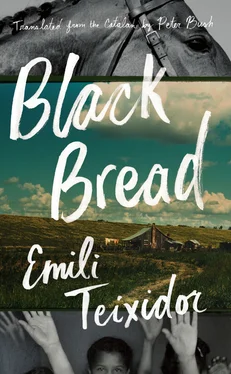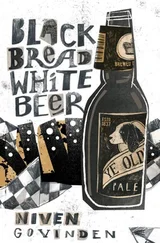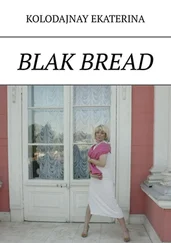Emili Teixidor
Black Bread
For Pep and Marina.
For Joan Rosaura and Anna M. Camprubí, friends.
“The deceit of History is the deceit Reality introduces.
There are endless vagaries that slip through the fissures in Reality. When people write History, they do so by fixing boundaries around names, even dates, thus attempting to squeeze what brims with infinity into a real, finite form. A time comes when you recall an event from your own world and don’t feel happy with the explanation, with the way Reality has been categorized and quantified. You feel that wasn’t true; it aspired to the truth, but didn’t make it.”
— Agustín García Calvo
“It would be hypocritical to look back to the years 1940–1945, and say they were terrible times. I think we are still fully within that era.”
— W.G. Sebald
From Easter to early autumn, when the weather was fine and the woods changed colour, we lived on the branches of trees.
We climbed all the trees in the fruit orchard strong enough to take the three of us and low enough to shimmy up without a ladder, and once we’d tested them out we decided on the old plum tree as our permanent base. The old plum tree’s branches were dark and welcoming like the bottom of a cauldron and the fork of its broad trunk with its three branches allowed us to lean back in comfort and divide the space fairly: one apiece.
The tree fork was the place where we met. The branches, on the other hand, were private territory, where we hoarded the things we wanted, and we treated the smaller branches as we felt fit, hung ribbons or paper from the leaves, picked plums to eat, which we weren’t duty-bound to share with our cousins, and we didn’t even have to reply to questions that shot out from neighbouring branches, as if we lived in a sealed chamber with walls of leaves that kept words out.
The other trees, next to the old plum, were mostly apples, with a few pears, and young plums or sloes with branches too slender to bear our movements, dwarf trees, as Grandmother called them, with thick foliage and stunted. Past the orchard were a couple of half-worm-eaten elms and the cherry tree by the bend in the track, the grove of oaks in the meadow, level with the spinney, and the huge elder tree at the back of the farmhouse that was so tall we’d never been able to count all the branches that spread out to infinity like a net cast over the roof. The elder tree was Grandmother Mercè’s favourite because apparently the flowers had medicinal properties, and whenever we could, we left the back windows open to allow the scent from the flowers to waft in — Grandmother called it “fragrance”—and the mere smell drove away all sickness, what she called “sickerliness,” and also tribulations when she imitated Father Tafalla’s words.
Only the old plum tree’s branches were long and strong enough to accommodate us. A natural house made of rough, dark, age-old timber as if from a log cabin in the middle of the woods or a sooty kitchen wall.
The apple trees were undersize and when the apples ripened, all their tops ballooned over, like bellies of pregnant women. And when they blossomed, the scent was too strong and sickly sweet and the blossom too white and dense. The pears were much the same. I was disgusted or frightened by the elms; their trunks were too old, scabby and perforated, as if they were rotten, and their branches were too small for their size, like the village blacksmith and the brawny men with big chests and small heads who took him their horses to shoe. The cherry was more welcoming, but its foliage was too thick and its branches too fragile for our aerial games, and the cherries stained clothes, hands and legs and that would give us away. Besides, its location, by the track that ran to the farmhouse on the side of the kitchen and meadow and then to Mother’s town, the factory town, made them all too visible to adult eyes. The oaks were too far from the house, even though they could have coped with our onslaught. And the elder, Grandmother’s tree, was beyond reach, a life-restoring medicinal wonder we thought was sacred.
The old plum tree was the ideal haven. Right opposite the farmhouse, sufficiently far away for us to hide yet visible enough to make it hard for anyone to accuse us of shirking, and its dense foliage spread out to make a kind of curtain that allowed us to see without being seen when we were up above, almost on a level with the house’s front gallery.
We kept an eye on everything from up there: the entrance, the galleries, the stables… On the left, we could see the meadow and oak trees by the track with the cherry tree that went to Can Tona and other neighbouring farms and through the spinney to Mother’s town, and a second broader track that went right round the house, past the well, animal troughs and lumps of rock salt, and on the right, surrounded by a barbed-wire fence, we could see the stables, chicken coop, pigsties and threshing-ground with haystacks, stooks and barns — Grandmother said city people couldn’t tell a stack from a stook; such a slip was enough for her to tell whether someone was a countryman or what she called a flat-footed city slicker — the pond at the top of the hillock made by the dip in the land and the small hazelnut spinney that skirted the stone wall round the monastery orchard. The second track re-emerged on the other side of the farmhouse to become the track to the school and neighbouring town — the other factory town was much bigger, Father Tafalla sometimes called it a village, but Grandmother never adopted that word, perhaps because it wounded her local pride — level with the huge forest that filled the whole distant landscape except on the side of the main road to Vic, with its double row of plane trees, arable land and the dark mass of the Saint Camillus of Llellis monastery, a place for sick young men who had been abandoned.
We’d stretch out along the branches at the top of the plum tree and spread our hands or arms over the smaller branches, Quirze on the highest, me in the middle, and Núria, tiny goldilocks, just under me, her head and back facing away from the farmhouse, while we boys had the house full in our sights and didn’t have to move our heads one inch to get a full view: visitors coming along the track, women in the top gallery mending clothes or separating the kernels of sweetcorn, men in the stables, animals penned in the threshing-ground or dipping their snouts in the pond, the dogs on the gravel in the entranceway, and the horses tied up to metal rings in the corner.
Núria always complained she couldn’t see a thing. We called her Cry-Baby.
“What’s going on? What’s going on? What can you see?” she asked when Quirze and I commented knowingly on what we’d spotted from our vantage points.
“We can’t see a thing,” Quirze retorted, not even bothering to look at her, as if he was speaking to himself. “At this time of day when people are having a siesta, nobody’s here, there’s nothing to see.”
Cry-Baby started to whimper it wasn’t right, you couldn’t see what was happening from her branch. But we paid no attention, and acted as if we couldn’t hear her. When she stopped, distracted by a small animal or to straighten messy fair hair that she never plaited properly, as if relenting, Quirze added, still acting as if he was talking to himself, but loud enough for us all to hear, in a tone that aped Grandmother’s voice and expressions when she told us horror stories, her scary ones, we’d call them: “This hour is like the depths of the night, when the only sound is what the shadows in the woods make. When a wind blows, a miserable night owl hoots ominously, the cries of the dying echo, the monastery bells toll, fearful whether the friars will arrive in time to give confession and the last rites, and the lamentations of the deceased who died in mortal sin…”
Читать дальше












